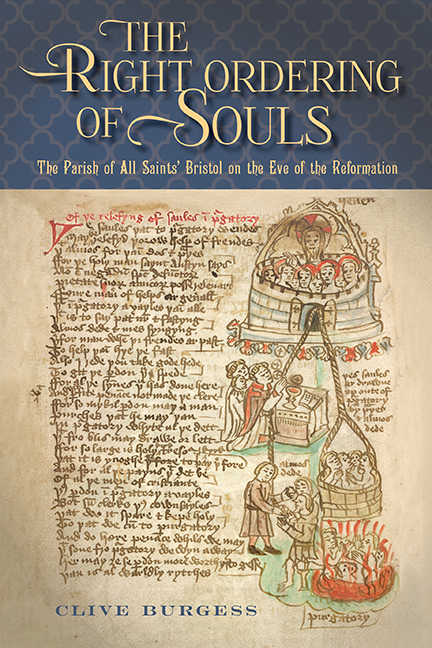Book contents
- Frontmatter
- Dedication
- Contents
- List of illustrations
- Acknowledgements
- Miscellaneous Frontmatter
- Abbreviations
- Notes
- map
- Part I For the increase of the divine service
- Part II All Saints’, Bristol, and its parishioners
- 2 ‘To be showed and declared’: Circumstances and sources
- 3 ‘According to the usage there’: Reading testamentary evidence
- 4 ‘Since his decease’: The widows’ might
- 5 ‘God amend them’: The parish wronged
- Part III Commemorating the dead
- Part IV Leaders and administrators
- Part V Ordering the parish
- Appendices
- Bibliography
- Glossary
- Index
- Miscellaneous Endmatter
4 - ‘Since his decease’: The widows’ might
from Part II - All Saints’, Bristol, and its parishioners
Published online by Cambridge University Press: 05 May 2018
- Frontmatter
- Dedication
- Contents
- List of illustrations
- Acknowledgements
- Miscellaneous Frontmatter
- Abbreviations
- Notes
- map
- Part I For the increase of the divine service
- Part II All Saints’, Bristol, and its parishioners
- 2 ‘To be showed and declared’: Circumstances and sources
- 3 ‘According to the usage there’: Reading testamentary evidence
- 4 ‘Since his decease’: The widows’ might
- 5 ‘God amend them’: The parish wronged
- Part III Commemorating the dead
- Part IV Leaders and administrators
- Part V Ordering the parish
- Appendices
- Bibliography
- Glossary
- Index
- Miscellaneous Endmatter
Summary
THIS chapter explores the contributions that four widows made towards All Saints’ to show how much parishioners might achieve when their understanding of the Church's penitential requirements found expression in the strong, shared urge to improve communal finances and amenities. Relatively few late medieval wills survive for women: in general, the proportion rarely exceeds 10 per cent in any surviving sample; by contrast, and simple good luck, women's wills constitute over 20 per cent of the collection for All Saints’ before the Reformation. These widows not only have surviving wills but valuable additional material also exists, found both in the Church Book's benefaction list and in the parish deed collection. All four women were wealthy and, as a result, their generosity may not be typical. Nevertheless, each of their examples – considered in turn – demonstrates how a widow serving as an executrix might prove far more adventurous than anything in either her own or her husband's will, even if we are lucky enough to have both, might lead us to assume or predict. If we could factor in the devotional investment that widows undertook, possibly as a matter of routine, our evaluation of lay achievement before the Reformation would almost certainly need substantial ‘upward’ revision.
Widows had been important benefactors before the fifteenth century. Alice Halye, who died in 1261, devised the parish her house, known as the Green Lattice, sited on the west side of the High Street slightly to the south of All Saints’ church. She had done this, as explained in her will,
to the perpetual provision of a light in the church for the Mass of the Blessed Virgin Mary before the high altar, that is to say towards wax to be made and repaired by the hands of the serving proctors [churchwardens] within the same parish, and in pure and perpetual alms, saving the service due to the lord of the fee, for my soul and the soul of William Halye, my man, and for the souls of all our ancestors and successors, in order that our souls shall specially be held in memory of the said church.
- Type
- Chapter
- Information
- 'The Right Ordering of Souls'The Parish of All Saints’ Bristol on the Eve of the Reformation, pp. 119 - 162Publisher: Boydell & BrewerPrint publication year: 2018

